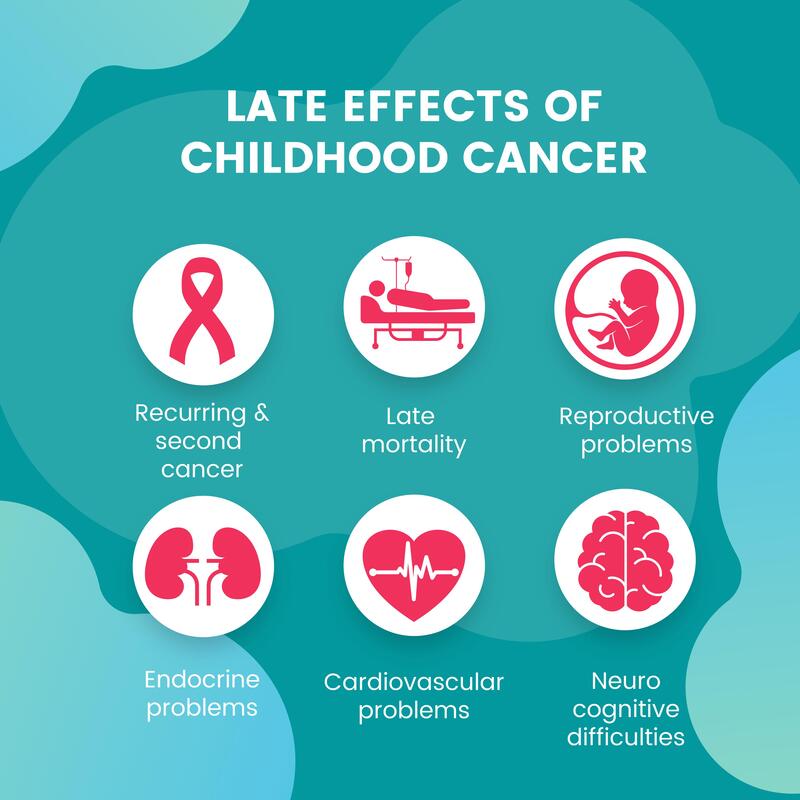With advances in cancer treatment, more than 80% of children who are diagnosed with cancer are surviving well into adulthood. However, despite increased survival, childhood cancer survivors face significant risk of developing late effects from their cancer and/or it’s treatment which develop years or even decades down the track. In fact, childhood cancer survivors report twice as many severe chronic health conditions by age 50, compared to healthy controls, and have 10-times the rate of mortality compared to the general population.
The late effects of cancer include physical and psychological concerns, both of which may significantly impact a survivor’s quality of life. As such, there is an urgent need to understand and systematically appraise the consequences of surviving cancer, across a range of cancer types and treatments.
Our recent study, ‘Childhood cancer survivors’ reported late effects, motivations for seeking survivorship care, and patterns of attendance’ assesses the late effects experienced by childhood cancer survivors, across all cancer diagnoses, as well as survivors’ views of engaging with survivorship care.
Understanding the late effects of childhood cancer
The physical late effects of childhood cancer and its treatment include, but are not limited to; second cancers, late mortality reproductive and endocrine problems and cardiovascular disease, all of which can negatively impact a patient’s quality of life. Concerningly, studies in North America have estimated that the cumulative incidence of late effects, 45 years post-diagnosis is as high as 95%. Notably, survivors frequently suffer from more than one late effect, with 81% of late effects estimated to be severe, disabling, life-threatening or resulting in death. Our study showed that late effects are associated with more intensive cancer treatments such as toxic chemotherapies and radiotherapy. This is because exposure to toxins such as chemotherapy alongside other factors including genetic predispositions, comorbidities, demographic factors and negative health behaviours directly influence a survivor’s risk of developing late effects.
| Specifically, of the 634 participants who completed the questionnaires, 79% reported at least one cancer-related late effect, most commonly fatigue (40%) and memory/learning difficulties (34%). Notably, those who had been diagnosed with a brain tumor reported a higher number of late effects than survivors with other cancer diagnosis. Survivors who experience physical late effects also report substantially poorer mental health compared with survivors who have a lower late effects burden. |
For example, many survivors experience frailty, which not only increases their risk of chronic disease and mortality but is also associated with poor mental health.
While some late effects of therapy may be easily managed during childhood, other conditions may persist well into the survivor’s adult years with the potential to manifest as chronic health concerns. Considering this, it is critical that a patient’s acute treatment needs are balanced against the potential for long-term toxicity and that they are engaged with long-term, survivorship care.
Engaging with survivorship care
Given the number of childhood cancer survivors are increasing, there is need to provide quality survivorship care so that late effects can be better managed and potentially mitigated. Follow-up care for cancer survivors includes monitoring for cancer recurrence, detecting any new cancers, treating ongoing symptoms, monitoring for late effects and receiving preventative care.
In Australia, less than half of survivors attend a survivorship clinic. It is most commonly survivors who are younger, closer in years to their diagnosis, or who have reported a high total number of motivating factors. Notably, all participants in our study endorsed at least one motivating factor for engaging in survivorship care. Survivors shared that understanding possible late effects, being reassured about their health, and knowing which tests they needed to stay healthy were the most important reasons to stay engaged with survivorship care. Given that survivors felt so strongly about the benefits of receiving survivorship care, it is concerning that less than half can engage in such care.
Looking forward
Despite improvements in cancer treatments and survival rates, childhood cancer survivors still experience a range of health problems, even decades after treatment completion. Survivors want to learn more about their risk of developing late effects and the tests they need to maintain good health, as well as seek reassurance about their wellbeing. By better understanding the burden of late effects and what survivors need and want within survivorship care, we can design more patient-centric survivorship clinics to ensure a better health future for survivors of childhood cancer.
Alexia Paglia & Dr Jordana McLoone

 RSS Feed
RSS Feed